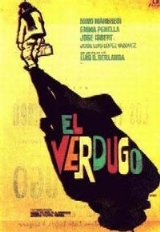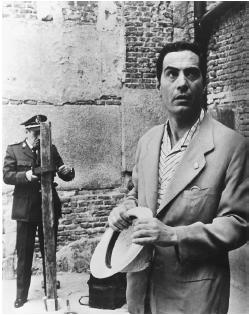
Not on Your Life
Encyclopedia

Plot
The story starts with the main character (an old executionerExecutioner
A judicial executioner is a person who carries out a death sentence ordered by the state or other legal authority, which was known in feudal terminology as high justice.-Scope and job:...
in Spain in the early 60's) approaching retirement age. As his profession is quite rare, he (a very gentle and nice man, caring, and proud of traditions) begins to worry about who might take his place when he retires. He has a daughter, but, unfortunately, she seems doomed to perpetual "spinsterhood": as soon as any prospective groom learns about her dad and her dad's "trade", he runs away from her, scared. However, a new character enters: the local undertaker, a young handsome man who has exactly the same problem... No girl wants him given his profession. So, you have the woman whom almost nobody would marry and the man whom almost nobody would marry. Obviously, they are meant for each other. But here the old executioner has something to say: He does not object to her daughter marrying the young undertaker; he seems a decent man, but only on condition that if the groom agrees to take the executioner's job when he will retire. And, anyway, as the old executioner says to the worried young man.... "Don't worry, they sentence people, but, in the last moment, they're going to pardon them.
Overview
El Verdugo was the eighth feature film written and directed by Luis García Berlanga in collaboration with his longtime associate, Rafael AzconaRafael Azcona
Rafael Azcona Fernández was an awarded Spanish screenwriter and novelist who has worked with some of the best Spanish and international filmmakers. Azcona won five Goya Awards during his career, including a lifetime achievement award in 1998.He was born in the northern Spanish city Logroño on...
. The story pivots upon the fate of a pleasant, if somewhat timid, young undertaker whose dream is to go to Germany and become a mechanic. This dream is thwarted when he happens to meet the executioner in a prison where both of them are plying their trade. In spite of the aversion that the young man (and everyone else) feels for the executioner, he not only ends up marrying the executioner's daughter, but even takes over his father-in-law's business.
El Verdugo is a farce
Farce
In theatre, a farce is a comedy which aims at entertaining the audience by means of unlikely, extravagant, and improbable situations, disguise and mistaken identity, verbal humour of varying degrees of sophistication, which may include word play, and a fast-paced plot whose speed usually increases,...
or domestic comedy filled with macabre touches and scenes of black humor in which the taboo
Taboo
A taboo is a strong social prohibition relating to any area of human activity or social custom that is sacred and or forbidden based on moral judgment, religious beliefs and or scientific consensus. Breaking the taboo is usually considered objectionable or abhorrent by society...
s associated with death are transgressed. Even the actual mode of execution is the subject of morbid jokes as the executioner, who garrots his victims, measures the neck size of his future son-in-law. The film is punctuated with these bits of gallows humor as well as with comic reversals that take the audience by surprise. A fine example of this occurs at the end of the movie when the young executioner is carried kicking and screaming like the victim into the prison
Prison
A prison is a place in which people are physically confined and, usually, deprived of a range of personal freedoms. Imprisonment or incarceration is a legal penalty that may be imposed by the state for the commission of a crime...
where he will perform his first execution.
Berlanga's irreverent treatment of death is symptomatic of a tendency found in all of his movies, to send up pomposity and pretensions, and to deflate generally accepted values and beliefs. In one sense, the film is about two outcasts, the undertaker and the executioner's daughter, both of whom are avoided by everyone. When they join together, it is with the hope of having a better life, but as Berlanga demonstrates, these hopes cannot be realized. Like other protagonists in Berlanga's film, the undertaker becomes caught up in a destiny which he did not choose. He is a victim of innocent concessions made along the way that ultimately lead him to be sentenced to his fate of becoming the executioner. He is the true victim, the one who is strangled in a web of circumstances beyond his control, caught up in the system of justice and retribution that is all encompassing. In the context of Franco's Spain, the ideological dimensions of this message are that as the executioner tells his son-in-law, where there's a law, someone has to pleasantly or not enforce it.
Cast
- Nino ManfrediNino ManfrediNino Manfredi was an Italian actor, one of the most prominent in the commedia all'italiana genre....
as José Luis Rodríguez, el enterrador - Emma PenellaEmma PenellaEmma Penella was a Spanish film and television actress.Emma Penella was the sister of Spanish actresses Elisa Montés and Terele Pávez, and the granddaughter of composer Manuel Penella. She was also the widow of producer Emiliano Piedra...
as Carmen, la hija de Amadeo - José IsbertJosé IsbertJosé Isbert , also known as Pepe Isbert , was a Spanish actor.-Biography:...
as Amadeo, el verdugo (as Jose Isbert) - José Luis López VázquezJosé Luis López VázquezJosé Luis López Vázquez de la Torre was a Spanish actor. -Career:López Vázquez was born in Madrid. He originally worked in theater as a costume designer, a scenic designer, and as an assistant director to Pío Ballesteros and Enrique Herreros. In 1946, he switched over to film, with a small role in...
as Antonio Rodríguez, el hermano mayor de José Luis - Ángel ÁlvarezÁngel ÁlvarezÁngel Álvarez was a prolific Spanish film actor.He made over 205 film appearances between 1945 and 1982. He is probably best known for his western films of the 1960s and 1970s. He appeared in Spaghetti western films such as Navajo Joe and Django in 1966 opposite Franco Nero...
as Álvarez, el enterrador (as Angel Alvarez) - Guido AlbertiGuido AlbertiGuido Alberti was an Italian film actor. He appeared in 60 films between 1963 and 1993.-Selected filmography:* Not on Your Life * Hands Over the City * Angélique, Marquise des Anges...
as Director de la prisión - Julia Caba Alba as Mujer visitante de la obra nº 2
- María Luisa PonteMaría Luisa PonteMaría Luisa Ponte was a Spanish actress. She appeared in over 135 films and television shows between 1952 and 1995...
as Estefanía (as Maria Luisa Ponte) - María IsbertMaría IsbertMaría Isbert was a Spanish actress whose credits included more than 250 Spanish films during her career. Isbert worked with most major Spanish film actors and directors, including Luis García Berlanga and Luis Buñuel...
as Ignacia (as Maria Isbert) - Erasmo Pascual
- Xan das Bolas as Guarda de la obra
- José Orjas (as Jose Orjas)
- José María Prada (as Jose Maria Prada)
- Félix Fernández as Monaguillo nº 2 (as Felix Fernandez)
- Antonio Ferrandis
Awards
Director Luis García Berlanga won the FIPRESCI Prize at the Venice Film FestivalVenice Film Festival
The Venice International Film Festival is the oldest international film festival in the world. Founded by Count Giuseppe Volpi in 1932 as the "Esposizione Internazionale d'Arte Cinematografica", the festival has since taken place every year in late August or early September on the island of the...
for the film.
At that moment, Francoist Spain was under international pressure because of the death sentence for the Communist leader Julián Grimau
Julián Grimau
Julián Grimau García was a Spanish Communist member.-Political activities:Initially active in the Federal Republican Party and the Republican Left, he joined the Communist Party of Spain upon the outbreak of the Spanish Civil War. Grimau spent the war years in Barcelona, where his father had been...
.
The Spanish ambassador to Italy protested the projection of this "Communist" film.

